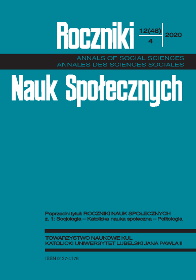Conceptual Fundamentals of Post-Westphalian International Relations
Abstract
Conceptual approaches to understanding the current stage of the evolution of international relations were put in place during the destruction of the bipolar world of the Cold War and the formation of new foundations of the world and international order. The distinctiveness of this process is that the collapse of the postwar system took place in peaceful conditions. Most often, two terms are used to describe the interconnectedness and interdependence of world politics after the fall of the Iron Curtain: the post-bipolar (post-westphalian) international system or international relations after the end of the Cold War. Two terms, post-bipolar international system and international relations after the end of the Cold War, have common features, which usually allows them to be used as synonyms and makes them the most popular when choosing a common comprehensive definition for the modern international relations. The collapse of the Soviet bloc and the global bipolar system put on the agenda issues that cannot be resolved within the traditional terms “poles,” “balance of power,” “configuration of the balance of power” etc. The world has entered a period of uncertainty and growing risks. the global international system is experiencing profound shocks associated with the transformation of its structure, changes in its interaction with the environment, which accordingly affects its regional and peripheral dimensions. In modern post-bipolar relations of shaky equilibrium, there is an obvious focus on the transformation of the world international order into a “post-American world” with the critical dynamics of relations between old and new actors at the global level. The question of the further evolution of the entire system of international relations in the post-bipolar world and the tendency of its transformation from a confrontational to a system of cooperation remains open.
References
Brzezinski Z., The Grand Chessboard: American Primacy and Its Geostrategic Imperatives, New York 1997.
Cohen S., Geopolitics of the world system, Lanham–Boulder–New York–Oxford: Rowman & Littlefield 2003.
Cohen S., Geopolitics: the Geography of International Relations, Lanham–Boulder–New York–London: Rowman & Littlefield 2015.
Системная история международных отношений, ред. А.Д. Богатуров, т. 1. Москва 2006.
Debating the Post-American World. What Lies Ahead?, eds. S. Clark, S. Hoque, London–New York 2012.
Deleuze G., Guattari F., A Thousand Plateaus: Capitalism and Schizophrenia, London–New York 2003.
Friedberg A.L., The Future of American Power, “Political Science Quarterly,” Spring 1994, Vol. 109, No. 1.
Galtung J., Die andere Globalisierung. Perspektiven für eine zivilisierte Weltgesellschaft im 21. Jahrhundert, Münster: Agenda-Verlag 1998.
Galtung J., A Structural Theory of Imperialism – Ten Years Later, Typescript, https://www.transcend.org/galtung/papers/A%20Structural%20Theory%20of%20Imperialism%20-%20Ten%20Years%20Later.pdf (Date of access: 29.09.2020).
Global Trends 2030: Alternative Worlds, a publication of the National Intelligence Council, https://www.dni.gov/files/documents/GlobalTrends_2030.pdf (Date of access: 29.09.2020).
Haass R.N., The Age of Nonpolarity. What Will Follo U.S. Dominance, “Foreign Affairs,” May/June 2008, Vol. 87, No. 3.
Huntington S.P., The Lonely Superpower, “Foreign Affairs” 1999, Vol. 78, No. 2.
Information technologies and global politics: the changing scope of power and governance, eds. J. Rosenau, J.P. Singh, New York: State University of New York Press 2002.
Kuźniar R., Pozimowojenne dwudziestolecie: 1989-2010. Stosunki międzynarodowe na przełomie XX i XXI wieku, Warszawa: Wydawnictwo Naukowe Scholar 2011.
Nye J.S. Jr., The Paradox of American Power: Why the Worldʼs Only Superpower Canʼt Go It Alone, New York: Oxford University Press 2002.
Onuf N., Center-Periphery Relations: What Kind of Rule, and Does It Matter?, “All Azimuth” 2017, Vol. 6, No. 1.
Rosenau J., Turbulence in World Politics. A Theory of Change and Continuity, New York–London–Toronto–Sidney 1990.
Rosenau J., New Dimensions of Security: The Interaction of Globalization and Localizing Dynamics, “Security Dialogue” 1994, Vol. 25, N 3.
Rosenau J., Study of World Politics, Vol. I, Theoretical and Methodological Challenges, London–New York: Routledge 2006.
Samuel A., Nouveau paysage international, Lyon: Chronique sociale 1990.
Simoniya N.A., Torkunov A.V., The New World Order: From Bipolarity to Multipolarity, “Policy: Political Research” 2015, No. 3.
Trenin D., Welcome to Cold War II, https://foreignpolicy.com/2014/03/04/welcome-to-cold-war-ii/ (Date of access: 29.09.2020).
Wohlforth W.C., The Stability of a Unipolar World, “International Security” 1999, Vol. 24, No. 1.
Zakaria F., The Post-American World and the Rise of the Rest, New York–London: W.W. Norton & Company 2008.
Исаев Б.А., Геополитические модели государства и мира, Научная сессия ГУАП. Сборник докладов: в 3 частях, Часть III. Гуманитарные науки, Санкт-Петербург 2015.
Переслегин С., Самоучитель игры на мировой шахматной доске, Москва 2005.
Переслегин С., В 2020-м нам придется выбирать между плохим и очень плохим, https://www.business-gazeta.ru/article/453029 (Date of access: 29.09.2020).
Толстов С., Міжнародна система початку ХХІ століття, „Зовнішні справи” 2013, № 9-10.
Шевцова Л., Кремль не оставил Европе выбора, заставляя ее выйти из угла и вспомнить о своих генах. Россия потеряла Европу, https://enovosty.com/blogs/full/2509-rossiya-poteryala-evropu (Date of access: 29.09.2020).
Copyright (c) 2020 Roczniki Nauk Społecznych

This work is licensed under a Creative Commons Attribution-NonCommercial-NoDerivatives 4.0 International License.


